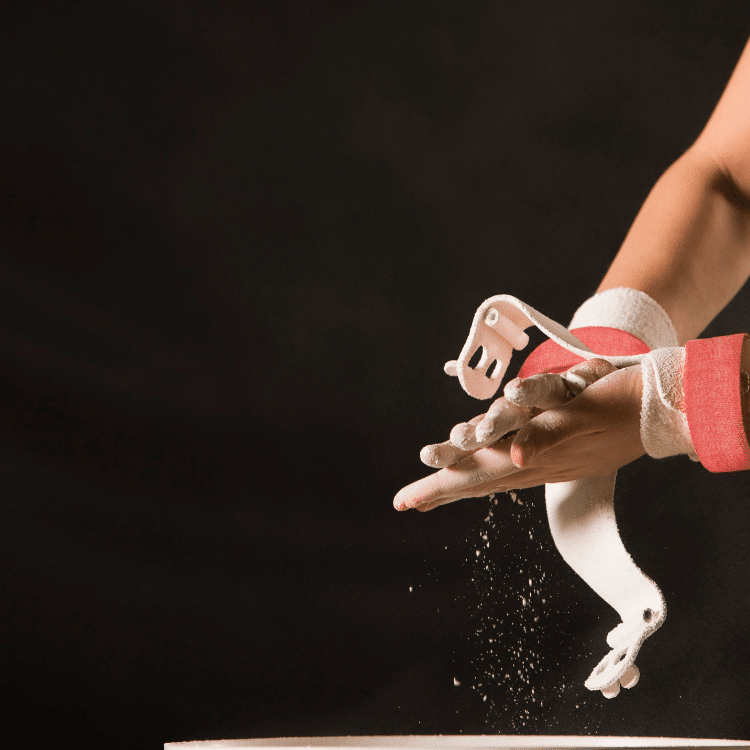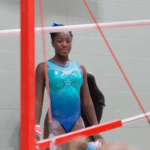Gymnasts retire very early compared to athletes in just about every other sport. A childhood full of commitment, long training hours and no social life takes its toll and most have retired by their early twenties. And to make matters worse, apart from a select few, gymnasts make very little money during their sporting careers and not enough cash to be set for life.
So what do gymnasts do after they retire?

Table of Contents
- Do gymnasts become coaches?
- Can a gymnast run away with the circus?
- Do gymnasts become stunt doubles?
- Can gymnasts go to college?
- Can a gymnast become an influencer?
- Do gymnasts switch sports?
- 5 retired gymnasts – where are they now?
The skillset gained from being a gymnast can be put to use in a variety of careers post-retirement. Discipline, effort, resilience and teamwork are very desirable characteristics for any employer whether it be a sports-related job or not. The wide range of careers taken up by ex-gymnasts proves this point and includes; teachers, doctors, politicians, actors and accountants to name just a few.
A handful of gymnasts can secure big-money endorsements – Simone Biles (United Airlines, Uber Eats), Ally Raisman (Ralph Lauren, GK Elite) but the other 99% of gymnasts will need to start earning once they stop training.
A change in NCAA policy now allows NCAA athletes, including gymnasts, to benefit from their Name, Image and Likeness (NILs). The impact of this hasn’t been fully established yet but it could potentially see young collegiate stars make big money from their huge social media followings.
Do gymnasts become coaches?
Gymnasts who want to stay in the sport after they retire often turn to coaching. It’s the ideal way to pass on the knowledge and experience they have accumulated over the years to the next generation.
It can also be a well-paid and stable job compared to other roles in gymnastics. For example, there are very few (if any) professional judges. Most will have other jobs and just judge at competitions in their spare time.
Coaching on the other hand can be a full-time job.
‘Do you have to be a gymnast to be a coach?’ is a question I hear a lot. The answer is no! Whilst it can be useful to have experience in training and competing it is not a necessity. The technical knowledge needed to become a coach can be learned by anyone, even those with no experience in gymnastics. This includes the author of this article, who had no experience in gymnastics before becoming a coach!
Can a gymnast run away with the circus?
The world-famous Cirque de Soleil is well known for recruiting ex-gymnasts to become performers. Representatives can often be found hanging around gymnastic facilities ready to offer very lucrative contracts. A performer can earn up to $100,000 per year and according to Cirque themselves, over 30% of their performers are ex gymnasts.
It is a very tempting career choice with extensive travel around the world and a chance to use many of the acrobatic skills learned during gymnastics training. However, the training hours are long and the constant traveling isn’t for everyone.
Do gymnasts become stunt doubles?
Most stunt doubles have a background in gymnastics, martial arts or extreme sports of some kind. Gymnastics training involves learning how to fall and roll safely something essential in stunt work.
Whilst it can be a hard industry to break into, established stunt doubles can earn upwards of $200,000 per year. However, the average salary for a stuntman will be a lot lower and work is not always consistent.
Examples of ex-gymnasts becoming stunt doubles include:
- Heidi Moneymaker
- Kristina Baskett
- Michaela McAllister
- Danusia Francis
- Damien Walters
- Aisha Gerber
Can gymnasts go to college?
Yes! The early peak age for gymnasts, especially girls, means that many gymnasts enroll in College after retiring as elite gymnasts.
On the other hand, many gymnasts go to college specifically to compete on the NCAA circuit. Up until 2021, gymnasts did have some difficult decisions to make though, as the NCAA had strict rules preventing athletes from making money whilst at college.
Gymnasts that are selected for the Olympics will usually be offered lucrative endorsement deals, which if accepted meant they were then ineligible for an NCAA team. Some Olympic gymnasts have declined commercial deals to be able to compete at college – Kyla Ross and Madison Kocian are two gymnasts who took this route.
Can a gymnast become an influencer?
Many top Gymnasts have built up loyal followings across social media platforms during their competitive years. Especially American girls competing in Women’s Artistic.
Brands are built on hard work, grit and determination and these girls have it in abundance. The select few who become successful Olympians have a huge amount of media exposure for a few weeks every four years. The smartest gymnasts will use this exposure to boost their following even more so that when the time comes to hang up their leotards, they still have a platform to promote themself and the brands they endorse.
Being a relatively new career choice for retired gymnasts it is still difficult to say how long ex-gymnasts will be able to make a living from Instagram and YouTube. But for the time being, these gymnasts, some of whom are retired, have a large following on social media:
- Simone Biles (6.9 million Instagram followers)
- Ally Raisman (2.1 million Instagram followers)
- Laurie Hernandez (1.5 million Instagram followers)
- Nastia Luikin (1.1 million Instagram followers)
- Nile Wilson (1.5 million YouTube subscribers)
Do gymnasts switch sports?
There are plenty of sports which are ideal for ex-gymnasts. Dance, Cheer, Diving and Ice Skating are examples of sports that also require similar body shaping, skills, strength and balance. Muscle memory is an amazing thing and high-level gymnasts are often very adaptable at picking up new skills.
On the downside, there are no real examples of senior elite gymnasts who have also reached elite status in another sport. Younger gymnasts often try something new when they hang up their leotards but does it really count when a 12 or 13-year-old gymnast quits training?
5 retired gymnasts – where are they now?
Let’s take a closer look at some retired gymnasts and find out where they are now and what they are doing.
Kerri Strug
Since Retirement: Masters Degree in Sociology, Teacher, Posts in the US Treasury Dept and US Justice Dept
Kerri Strug was a member of the ‘magnificent seven’ who won gold at the 1996 Atlanta Olympics. She is well remembered for performing a crucial vault for the team despite having injured her ankle. This shot her into national stardom and Kerri found herself meeting Bill Clinton and appearing on Saturday Night Live.
Having earned a Master’s Degree from Standford University, Strug worked for a time as an elementary school teacher in San Jose before moving to Washington and embarking on a career in government. She has also worked for various community organizations and has even found time to author two books!

Amy Chow
Since Retirement: Pediatric Surgeon
Amy Chow represented the USA at both the 1996 and 200 Olympics, winning three medals in the process. She was nicknamed ‘the trickster’ because of her high difficulty levels within routines.
Chow graduated from Standford University in 2002 and subsequently attended Medical school, also at Standford. Chow had started to study whilst still training as a gymnast towards the 2000 Olympic games so had to juggle an intense training regime with her studies.
After completing her studies, Chow became a licensed surgeon and physician and now runs a private practice in northern California.
Jordyn Wieber
Since Retirement: Gymnastics Coach
A member of the ‘fierce five’ that won gold at the London Olympics, Jordyn Wieber was the first to retire from the group. After London, she studied Psychology at UCLA but due to her endorsement deal with Adidas, she was ineligible to represent the college as per NCAA rules at the time. Instead, she worked as a Team Manager and continued to coach the Bruins even after her graduation.
In 2019 she took charge of the Arkansas Razorbacks Gymnastics program. In doing so she became the first Olympic champion to become Head Coach of an NCAA team.
Shannon Miller
Since Retirement: Business Woman, Childhood Obesity Campaigner
Another member of the magnificent Seven from Atlanta in 1996, Miller also competed at the Barcelona games in 1992. Throughout her career, Shannon Miller won an incredible 16 medals at the World and Olympic games which is second only to Simone Biles.
After retiring in 2000, Shannon Miller went to college graduating in 2003 from the University of Houston with a degree in Marketing and Entrepreneurship. She then graduated from Boston Law School in 2007. In 2011 she was diagnosed with ovarian cancer which she successfully recovered from later the same year.
Shannon Miller Lifestyle, the business she co-founded, sees her undertake public speaking events and release fitness videos. Miller also released her autobiography in 2015.

Courtney Kupets
Since retirement: Gymnastics Coach, Performer and Commentator
Courtney Kupets is a two-time Olympic medalist and two-time gold medal winner at the World Championships. Following the 2004 Olympics, Kupets enrolled at the University of Georgia and helped UGA win four straight NCAA titles from 2006-2009.
Kupets then transitioned into coaching, initially as an assistant coach, then in 2017 as Head Coach for the University of Georgia’s Women’s Gymnastics Team.
As well as coaching, Kupets has performed in the Las Vegas-based show Le Reve and has worked as NBC’s gymnastics commentator.
Latest Articles
- A Complete Guide to Gymnastics RipsAre you tired of dealing with painful gymnastics rips on your hands from training? Look no further – this article offers a comprehensive approach to… Read more: A Complete Guide to Gymnastics Rips
- The 12 Types of Trampoline (explained)Trampolines, a staple of joy and fitness, cater to all ages, inspiring kids and adults alike to leap out of their indoor routines into a… Read more: The 12 Types of Trampoline (explained)
- How is Gymnastics Scored? (answered)In the world of gymnastics, every flip, spin, and leap is a blend of athleticism, precision, and artistry. But how is gymnastics scored accurately and… Read more: How is Gymnastics Scored? (answered)
- Gymnastics Laser Beam: Revolutionizing TrainingGymnastics continually evolves with innovative and helpful training equipment. Among these advancements, the Gymnastics Laser Beam by Tumbl Trak stands out, redefining the way gymnasts… Read more: Gymnastics Laser Beam: Revolutionizing Training
- 41 Gymnastics Bar Moves (explained)Gymnastics bar moves are considered some of the hardest in the whole of the sport due to the immense strength and flexibility needed to perform… Read more: 41 Gymnastics Bar Moves (explained)
- Level 5 Gymnastics Skills (Guide)This guide delves deep into the Level 5 gymnastics skills, providing insights, breakdowns, and an expert perspective on each skill and its significance in a… Read more: Level 5 Gymnastics Skills (Guide)






